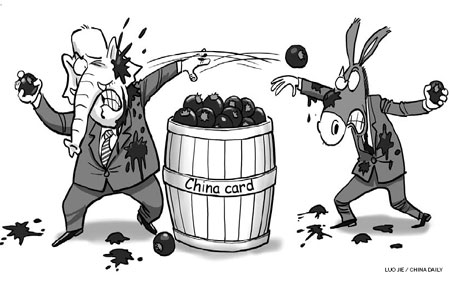Op-Ed Contributors
US polls and China bashing
Updated: 2011-08-25 07:39
By Daniel Levin (China Daily)

Election season is silly season in the United States, and this is particularly true during the primary campaigns of the two main political parties. This is the time when the candidates appeal to the very lowest instincts of their parties' extreme base, with some vague intention of then later swinging back to the so-called moderate center in the general election to sway independent voters.
Since the Democratic Party currently has the incumbent in the White House, the country will be spared at least one party's electoral extravaganza, despite some Democrats fantasizing about a primary challenge to President Barack Obama. On the other hand, Republican Party hopefuls aiming to supplant Obama recently kicked off what promised to become an expensive, visceral, loud and outrageous primary campaign season.
Americans are accustomed to shrill hyperbole in the electoral process, when crude, simplistic and jingoistic slogans are in high demand, and reasonable, measured and substantive discourse is in short supply.
However, the upcoming election season promises to stoop to new lows, and unabashedly disparaging comments about Obama as well as aggressive verbal attacks on all forms of government - currently, the Environmental Protection Agency seems to be the preferred whipping boy - are ominous harbingers of countless outrageous episodes leading up to the elections in November 2012.
Perhaps some of the zealous nastiness can be explained by the deep economic recession the country finds itself in, though it seems more likely that we are simply witnessing the powerful continuation of a precipitous decline in political culture that started long ago. The candidates' polemics are extraordinarily testy, and it is scary to imagine encore performances to follow some of the recent pronouncements.
Texas Governor Rick Perry accusing Federal Reserve Chairman Ben Bernanke of "treason" for trying to boost the US economy with higher money supplies ahead of next year's election is as inflammatory as it is fraudulent, given Perry's past musings about his state of Texas seceding from the country.
Not to be outdone, Michele Bachman, Republican member of House of Representatives, flaunts her penchant for the most divisive issues, such as favoring the reinstatement of the ban on openly gay or lesbian people serving in the military. All these statements - ranging from the comical to the absurd to the unhinged - are intended to fire up the extreme fringe of the party base, and when the candidates agree on anything, it hovers around the lowest and most mean-spirited common denominator.
While these proclamations are dismissed as business as usual in an election, we are also seeing some statements on the foreign policy front that cannot be viewed as innocuously. Political candidates of all stripes feel it is safe to criticize and attack foreign countries and governments to boast their foreign policy credentials and to prove their staunch patriotism.
Not one of the current hopefuls can even remotely be considered a foreign policy expert, yet over the course of the campaign season we are being inundated by undignified utterances about other countries, which have the potential to cause real harm to America's international relations. Lambasting foreign countries seems to be an irresistible urge for political candidates, in part because domestic voters will not punish them for even the most disgraceful remarks directed against foreign targets.
Since the end of the Cold War, new villains have not been as obvious or easy to come by as replacement of the Soviet Union, branded as the "evil empire" by former US president Ronald Reagan. Then the attacks of Sept 11, 2001, delivered Al-Qaida and Islamic terrorism as an enemy everyone could agree on, though the ensuing vitriol was somewhat diluted and cluttered by America's ties to Islamic countries because of its dependence on fossil fuels. So the question is: which nation would serve as the boogeyman for this era and its campaign season?
Enter China. Bashing China is increasingly becoming a political cri de coeur for many candidates, and the chorus extends to politicians on both sides of the aisle. We can laugh off Donald Trump as a comically clueless clown who excels at little other than self-aggrandizement, but his screeching contentions on China during his short-lived campaign as a Republican presidential candidate were as calculated as they were damaging. His vulgar crescendo from "China is not our friend" to "China is raping our country" to utterances that defy basic decency may have delivered Trump to the spotlight he so furiously craves, but one does have to wonder about the depth of a political candidate's patriotism, when he is so easily willing to jeopardize what should be considered the most important foreign relation of the US with such reckless and inappropriate statements.
Unfortunately, Trump is not alone. The other candidates regularly try to outshine their rivals in denouncing China in the most offensive and provocative manner.
The US and China are entangled at many geopolitical, economic and military levels. The interests of the two countries are not always aligned, and some of the disagreements can be challenging for both sides. At the same time, there is absolutely nothing to be gained by disparaging and condescending vituperations made for the sole purpose of narrow political gains in a national arena.
Even if it is understood by all that the election season tends to bring out the worst in people, the loss of trust and collateral damage caused by a never-ending barrage of irresponsible statements can be considerable.
The US seems to be approaching a crossroad as it struggles to redefine its social contract, and the ascension of the Tea Party or the recent debt ceiling fiasco are mere appetizers for the national debates that will rage in the months to come. At the same time, the US is not the only country that is facing a potential leadership change in 2012. In China, the 18th National Congress of the Communist Party of China will contain certain aspects of a generational transformation.
These are momentous periods for both countries, which are occurring in an increasingly volatile global environment, and it ill behooves US politicians to inflame the emotions for the sake of a quick sound bite. Given the enormous economic, military and political stakes at play in the relationship between the two nations, the differences and disagreements that exist should be tackled in a responsible and level-headed dialogue rather than through rabble-rousing electoral grandstanding.
The author is a member of the board of the Liechtenstein Foundation for State Governance.
(China Daily 08/25/2011 page9)

Specials

Biden Visits China
US Vice-President Joe Biden visits China August 17-22.

Star journalist leaves legacy
Li Xing, China Daily's assistant editor-in-chief and veteran columnist, died of a cerebral hemorrhage on Aug 7 in Washington DC, US.

Hot pots
Tea-making treasures catch the fancy of connoisseurs as record prices brew up interest